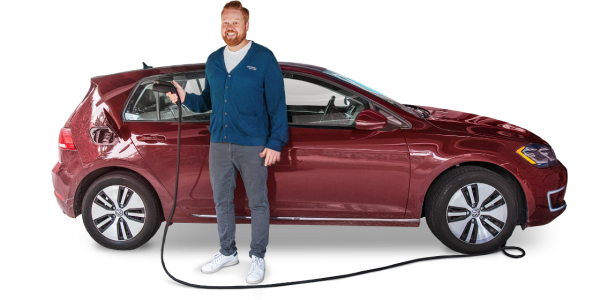Comparing long-term ownership costs
Compared to buying or leasing a gas-powered vehicle, the cost of buying or leasing an electric vehicle (EV) can seem quite high at first glance. But as with most differences between gas-powered vehicles and EVs, the more you explore the cost of owning an EV, the more it makes sense.
Gas-powered vehicles do seem to be better value at purchase, but their long-term fuel and maintenance costs can mount up quickly.
Meanwhile, EVs might be more expensive to buy or lease, but the cost of charging them is less than the cost of gas for an equivalent gas-powered vehicle. And with far fewer mechanical parts, they also require a lot less maintenance.
Let's look at these three areas to see how an EV could not only help save the planet, but also save you money.
Purchase price
Buying an EV might not be as expensive as you think
While the price of gas-powered vehicles seems to go up every year, the intense competition between EV manufacturers means that there's a wider choice of lower-priced vehicles than ever before. And it's going to get even better over the next few years.
Plus, as you're calculating the up-front purchase price of a new EV or plug-in hybrid vehicle (PHEV), make sure you factor in the provincial and federal rebates currently available. Combined, these can bring your purchase price down considerably:
- Find out about the Government of B.C.'s CleanBC Go Electric incentive program.
- Find out about Transport Canada's Zero-Emission Vehicles (ZEV) incentive program.
In addition to these incentives, you may be eligible for SCRAP-IT, a B.C. program that offers incentives to scrap high-polluting vehicles when you buy a new or used EV – or other type of low-carbon transportation.
Learn more about EV incentives in B.C.
Fuel costs
Comparing fuel costs
Fuel costs are the most obvious way an EV can save you money over a gas-powered vehicle.
You can find and compare figures for specific vehicles based on your typical mileage using our fuel savings calculator.
Time-of-day electricity pricing
If you do buy an EV and can charge it at home, consider opting into our tiered rate with time-of-day pricing for your home electricity service.
Designed with EV owners in mind, this plan provides discounts when you shift electricity use – such as EV charging – to overnight, and surcharges for use during busier periods. Learn more and estimate your costs.
Upkeep costs
EV maintenance is a lot cheaper than you might think
There's another way a battery electric vehicle (BEV) can also save you a lot of money: maintenance.
Some estimates indicate that average maintenance costs for a vehicle can be around $500 to $700 a year – and these costs typically climb as your vehicle ages.
So don't be put off by that higher EV purchase price. Take a few minutes to run the long-term numbers and see how much you might save. And if you're still not sure, find out what other EV owners have to say.


